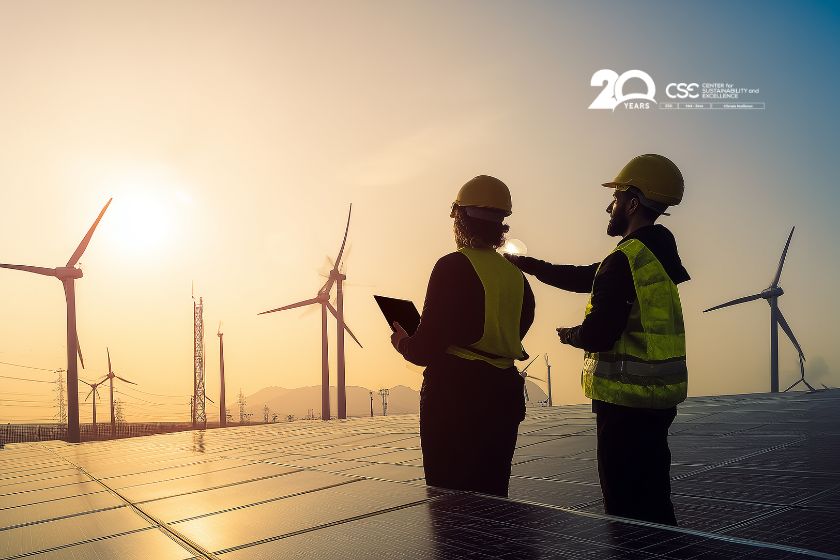The UK’s clean energy sector is undergoing a dramatic expansion. According to the UK Government’s Net Zero Strategy, over 400,000 jobs are expected in low-carbon sectors by 2030, spanning offshore wind, hydrogen, nuclear, carbon capture, energy networks, and retrofitting of buildings.
However, this growth comes with a catch.
While technical skills remain critical, today’s employers, regulators, and investors also expect professionals to understand ESG, Environmental, Social, and Governance principles that underpin long-term, sustainable value creation.
ESG is integral to how clean energy projects are financed, operated, and measured. And it’s reshaping career paths across engineering, sustainability, finance, consulting, and operations.
Why ESG Skills Matter for Clean Energy Careers
Here’s how ESG skills enhance your career potential in the UK clean energy job market:
- Higher Career Mobility and Demand
Companies are actively seeking talent who can link technical projects to ESG impacts from climate risk and net zero goals to workforce transition and community engagement.
A PwC report found that 80% of UK CEOs plan to invest more in ESG initiatives and want teams with relevant skills to lead them.
- Access to Strategic Roles
Professionals who understand ESG can move into roles involving:
- Sustainability strategy
- Investor reporting
- Regulatory alignment (e.g., CSRD, ESRS, TCFD)
These roles often sit closer to leadership and influence decision-making beyond technical delivery.
- Alignment with UK and EU ESG Regulations
Many UK organisations are affected by EU ESG directives, especially if they:
- Operate in EU markets
- Work with European investors
- Sit within international supply chains
Familiarity with frameworks like ESRS, GRI, and SASB makes you a strategic asset.
- Credibility with Stakeholders
Clients, regulators, and banks increasingly ask questions like:
- “How does this project address Scope 3 emissions?”
- “Is there a social impact or just transition plan?”
- “Is the supply chain ESG-compliant?”
The ability to respond with fluency builds trust.
How to Build ESG Skills for a Clean Energy Career
Here’s a step-by-step roadmap to help you integrate ESG into your professional toolkit:
- Identify Where ESG Intersects with Your Role
Whether you’re in engineering, finance, HR, or consulting, ESG plays a role in:
- Emissions reduction (E)
- Fair workforce practices (S)
- Ethics, transparency, and risk (G)
Start by mapping where ESG overlaps your daily responsibilities.
- Learn the Language of ESG
Familiarity with global and EU-aligned frameworks is essential:
- GRI (Global Reporting Initiative)
- SASB (Sustainability Accounting Standards Board)
- TCFD (Task Force on Climate-related Financial Disclosures)
- ESRS (European Sustainability Reporting Standards)
Also, understand key terms: Scope 3, materiality, just transition, greenwashing, double materiality.
- Assess Your Current Knowledge
Ask yourself:
- Do I know how my organisation reports on ESG?
- Can I explain how our projects support net zero targets?
- Have I been involved in ESG audits, supplier assessments, or community engagement?
Your answers help highlight your ESG skill gaps.
- Choose a High-Quality ESG Training Programme
Look for programmes that:
- Focus on real-world, EU-relevant applications
- Are delivered by experienced practitioners
- Include case studies and frameworks
For example, the Europe Sustainability (ESG) Training – Advanced Edition is designed to provide practical, business-integrated ESG skills for professionals across sectors.
Tip: Avoid programmes that are purely theoretical or generic ESG is most valuable when applied practically.
- Apply ESG Skills in Your Work
Put training into practice by:
- Improving internal policies and KPIs
- Participating in ESG reporting or materiality assessments
- Engaging suppliers on sustainability
- Shaping workforce transition and DEI plans
This application is what converts ESG knowledge into career capital.
Common ESG Mistakes Professionals Make
Even experienced professionals often make the following missteps:
- Thinking ESG is just about reporting: It’s also about strategy, governance, and stakeholder engagement.
- Focusing only on environmental aspects: Social and governance dimensions are just as important.
- Assuming ESG is “only for the EU”: Many UK investors, clients, and multinationals already demand ESG alignment.
Avoiding these traps helps position you as a forward-thinking, well-rounded professional.
Real-World Impact: ESG in UK Clean Energy Projects
Here’s how ESG skills are being used today:
- Offshore Wind Projects
ESG frameworks help teams set clear KPIs for biodiversity impact, community engagement, and emissions tracking.
- Hydrogen and Grid Projects
Professionals apply ESG to assess climate resilience, regulatory risk, and labour practices across the supply chain.
- Workforce Reskilling
HR and sustainability leaders build just transition plans that align with social metrics and fair work standards.
- Sustainable Finance
Finance teams translate clean energy project outcomes into ESG terms that meet lender and investor expectations.
These aren’t theoretical use cases, they’re happening across the UK now.
FAQs: What is ESG in clean energy jobs, in simple terms?
It’s a set of principles that ensure clean energy projects are not just technically effective, but also:
- Environmentally responsible
- Socially inclusive
- Governed with integrity
Are ESG skills really worth it for my career?
Yes. ESG is becoming non-negotiable in mid- and senior-level roles across energy, finance, sustainability, and infrastructure. It helps future-proof your career.
How long does it take to gain ESG skills?
A focused ESG training programme can give you a strong foundation in a matter of days. Real mastery comes from applying what you learn over time through your projects.
Prepare Now, Lead Tomorrow
The UK’s clean energy transformation is here and ESG skills are the currency of leadership in this space.
If you want to:
- Stand out in the clean energy talent market
- Lead sustainable, future-ready projects
- Align with regulatory, investor, and stakeholder demands
Now is the time to upskill.
Explore: Certified Sustainability (ESG) Practitioner Program – Advanced Edition 2025: Designed by practitioners for professionals, this programme bridges technical work and ESG leadership in real-world contexts.







